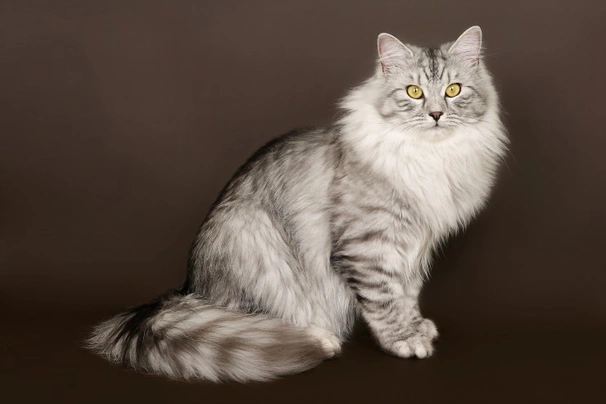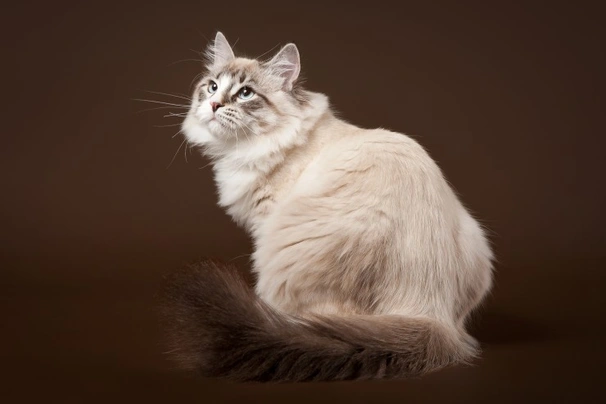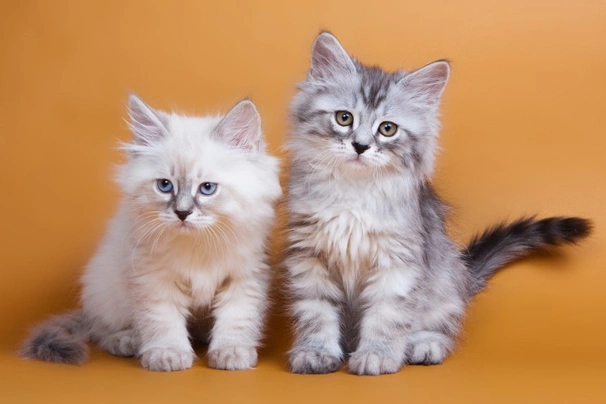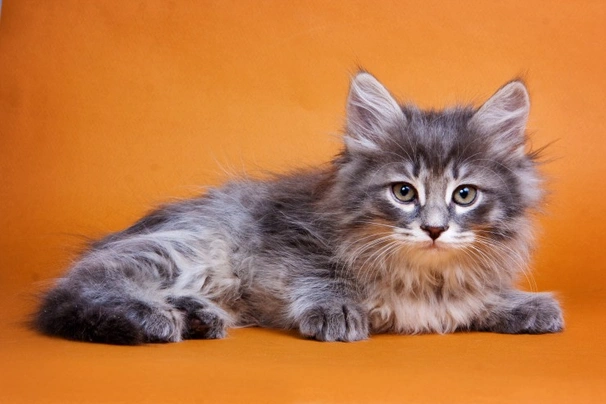Siberian
Introduction of the Siberian
The Siberian is a powerful looking cat and one that is not only very agile but capable of jumping up to great heights too. They are medium to large size cats and they boast having lovely large paws which adds to their overall charming appeal. They have luxurious coats and lovely personalities to match their good looks. Since they first arrived in the UK they have found their way into the hearts and homes of many cat lovers and for good reason. Not only is the Siberian a lovely looking cat but they boast having gentle playful and affectionate natures along with an extremely impressive purr.
History of the Siberian
The Siberian is an ancient breed with early references to similar cats dating back to 1000 AD. There are written records of these cats that go back to the 13th century however the first Siberians were only exhibited in 1870 and then in 1884 at shows that were held in Madison Square Gardens in the States. Over time these large and attractive cats could be seen in Siberian forests around markets and living as street cats in Siberia.
As Russia opened its borders to other countries many people started to domesticate these feral cats and pretty soon they became known as the Aboriginal Cats of Russia and were exhibited at many shows. The very first breed standard was drawn up in 1987 and cats started to be exported to other parts of the world during the 1990s.
Although considered an ancient breed the Siberian was only introduced to the UK in 2002 and since then they have gained a big fan base among breeders and owners alike. The Siberian is a very attractive large cat with a glorious semi-long coat and they are known to have delightful playful and gentle natures which has seen them become a popular companion and family pet not only in the UK but elsewhere in the world too.
Appearance of the Siberian
The Siberian is a very attractive semi-longhair cat that boasts having an extremely weather-resistant double coat which tends to be a lot longer and thicker during the colder winter months than it is in the summertime. They are powerful looking but when needed they are extremely agile on their feet and very capable of leaping to great heights. Females tend to be noticeably smaller and lighter than their male counterparts.
Their heads are large but nicely in proportion with the rest of their bodies and they are wedge shape with nicely rounded contours. Muzzles and chins are slightly rounded too. A cat's lower forehead is a little domed and when seen in profile there is a slight concave curve at the bridge of a cat's nose. They have nicely developed whisker pads which adds to their charming appearance. Cat have well defined cheekbones which extend to the outer base of each ear and which are low set and broad being connected to a cat's whisker pads and chins which results in their foreign looks.
Their ears are medium in size with rounded tips being set nicely apart and well furnished. The Siberian has lovely large oval shaped eyes which are set a little obliquely and nicely apart. Eyes can be any colour however in van and white patterned cats eyes should only be blue or odd coloured and colourpoints should have blue eyes.
They have rectangular bodies that are never too long. However a cat's body is medium to large and well-muscled with nice broad chests. Their necks are short but powerful and legs are nicely in proportion to a cat's body being moderately long and showing a good amount of bone. Siberians as previously mentioned boast having very large round paws with tight toes which are nicely tufted adding to a cats overall wild heritage. Tails are broader at the base moderately long and very well furnished tapering slightly to the tip.
When it comes to their coat the Siberian boasts having a dense extremely weather resistant double coat that consists of a thicker top coat and much softer undercoat. Their coats are semi-long with the hair being shorter over a cat's shoulders whereas their flowing guard hairs cover a cat's back their flanks and upper side of their tails. A cat's underside and their breeches consist of just the undercoat which is dense and plush. The longer hair around a cat's neck forms a dense and profuse ruff.
Siberians come in a variety of colours and patterns which includes the following:
- Chocolate - a cat's coat can be various shades of chocolate
- Cinnamon - a cat's coat can be various shades of cinnamon
- Caramel - a cat's coat can be various shades of caramel
- Colour pointed - Neva Masquerade
- Bi-colour
- Tri-colour
- Tabby
Siberians are allowed to have any amount of white in their coats which is acceptable under the GCCF standard. This includes having white paws white on their bellies and blazes on a cat's face.
Temperament of the Siberian
Like a lot of other breeds the Siberian likes a routine and doesn't particularly like it when this changes for any reason. They like to be fed at the same time of the day and don't appreciate it when furniture gets moved around the home. With this said the Siberian adapts well to many different types of home environment and are known to be fun-loving and playful. They mature very slowly only reaching full maturity when they are anything from 4 to 5 years old.
They also seem to be fascinated by water and cats have been known to watch a dripping tap so they can swipe at the drips which they find enthralling. They also like to paddle in ponds and will often reappear indoors with wet paws or soaking wet after having fallen in. Siberians are highly intelligent energetic cats by nature and need to be kept busy when they are not cat napping that is. They are also known to be rather inquisitive and like to investigate their surroundings whenever they can. However cats should only be allowed to explore the great outdoors if it is safe for them to do so.
The good news is that Siberians adapt well to living as indoor pets as long as they are given lots of things to occupy their minds and places they can climb up to so they can look down on what is going on below which is something they adore doing. They are often compared to dogs in many of their behaviours which includes cats digging holes in flower beds. They form extremely strong bonds with their owners and being so intelligent the Siberian is a fast learner enjoying games like "fetch" and chase the ball.
Although high energy cats the Siberian is also known to be extremely patient and tolerant which in short means they make wonderful companions and more especially family pets. They thrive in a home environment and like being involved in everything that goes on around them. When happy a Siberian has a rather impressive purr and although not overly talkative they do boast having a very sweet voice which is more like a chirrup than a meow.
Intelligence / Trainability of the Siberian
The Siberian is a highly intelligent cat and one that learns new things extremely fast. They enjoy playing interactive games which includes things like chase the ball or fetch. They are known to be quite dog-like in many of their behaviours and have a real fascination with water unlike many other breeds. Although they form strong bonds with their owners and love playing interactive games with them a Siberian is good at amusing themselves and will play with a toy to keep busy when they are left on their own which is why it’s important to invest in some good quality toys when sharing a home with a Siberian.
Children and other
Siberians with their outgoing affectionate fun-loving personalities are a great choice for families with children and this includes toddlers. They are extremely tolerant and patient cats by nature which means they put up with a log when it comes to interacting with children. However care has to be taken when very young children are around cats and any interaction should always be supervised by an adult to make sure things stay nice and calm. With this said children need to be taught how to behave around cats and when it is time to leave them alone.
They also get on well with dogs more especially when they have grown up together in the same household. However care has to be taken when introducing a Siberian to dogs they don't already know just in case the dog does not get on with their feline counterparts. Siberians are incredibly social by nature and have been known to get on with small animals. However it's always wiser to keep a close eye on any cat when they are around smaller pets just in case their prey drive gets the better of them bearing in mind that Siberians are very adept and skilled hunters.
Health of the Siberian
The average life expectancy of a Siberian is between 12 and 15 years when properly cared for and fed an appropriate good quality diet to suit their ages.
The Siberian is known to suffer from a few hereditary health issues which are worth knowing about if you are planning share your home with one of these intelligent high energy cats. The conditions that seem to affect the breed the most include the following:
- Hypertrophic cardiomyopathy
- Pyruvate kinase (PK) deficiency - breeders should have stud cats tested
Caring for the Siberian
As with any other breed Siberians need to be groomed on a regular basis to make sure their coats and skin are kept in top condition. On top of this cats need to be fed good quality food that meets all their nutritional needs throughout their lives which is especially true of kittens and older cats.
Grooming of the Siberian
Siberians boast having semi-long dense coats and as such they are quite high maintenance on the grooming front. Cats need to be regularly brushed to prevent knots and tangles forming in their coats. Like other breeds they tend to shed the most in the Spring and then again in the Autumn when more frequent brushing is usually necessary to keep on top of things. Their coats are a lot lighter during the summer months but they still need to be brushed several times a week to keep things tidy.
It's also important to check a cat's ears on a regular basis and to clean them when necessary. If too much wax is allowed to build up it can lead to a painful infection which can be hard to clear up. In short prevention is often easier than cure with ear infections. Cats often suffer from ear mites which can be a real problem which is why it's so important to check their ears on a regular basis.
Exercise of the Siberian
Siberians are known to be extremely playful and they don't really fully mature until they are around 4 to 5 years old. They also have a tremendous fascination with water which often sees cats playing with drips from a tap or paddling in ponds. They have a tremendous amount of energy when they are not napping that is and as such they like to be kept busy. If it is safe for cats to go outside there's nothing a Siberian enjoys more than to explore their environment which also allows them to mark their territory and hunt down prey which they are very adept at doing.
Cats kept as indoor pets need to be given lots of things to do and places to hide when they want to bearing in mind that the Siberian loves to climb up high so they can look down on the world below. They also need to have lots of places they can snuggle up for a snooze when the mood takes them because if there is one thing Siberians love doing it's taking a cat nap or two during the day.
Feeding of the Siberian
If you get a Siberian kitten from a breeder they would give you a feeding schedule and it's important to stick to the same routine feeding the same kitten food to avoid any tummy upsets. You can change a kitten's diet but this needs to be done very gradually always making sure they don't develop any digestive upsets and if they do it's best to put them back on their original diet and to discuss things with the vet before attempting to change it again.
Older cats are not known to be fussy eaters but this does not mean they can be given a lower quality diet. It's best to feed a mature cat several times a day making sure it's good quality food that meets all their nutritional requirements which is especially important as cats get older. It's also essential to keep an eye on a cat's weight because if they start to put on too much it can have a serious impact on their overall health and wellbeing. Like all other breeds Siberians need free access to fresh clean water at all times.
Siberian price
If you are looking to buy a Siberian you would need to pay anything from £150 to well over £650 for a well-bred pedigree kitten. The cost of insuring a male 3-year-old Siberian in northern England would be £15.02 a month for basic cover but for a lifetime policy this would set you back £29.47 a month (quote as of September 2017). When insurance companies calculate a pet's premium they factor in several things which includes where you live in the UK a cat's age and whether or not they have been neutered or spayed among other things.
When it comes to food costs you need to buy the best quality food whether wet or dry making sure it suits the different stages of a cat’s life. This would set you back between £15 - £20 a month. On top of all of this you need to factor in veterinary costs if you want to share your home with a Siberian and this includes their initial vaccinations their annual boosters the cost of neutering or spaying a cat when the time is right and their yearly health checks all of which quickly adds up to over £600 a year.
As a rough guide the average cost to keep and care for a Siberian would be between £40 to £60 a month depending on the level of insurance cover you opt to buy for your cat but this does not include the initial cost of buying a well-bred kitten.

GCCF/TICA Parents healthy chunky babies
£900
🐱 6 Siberian neva masquerade kittens 🐱
£1,150



